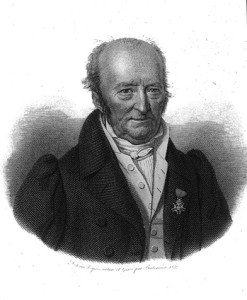Pierre-André Latreille
Latreille, Pierre-André
Pierre-André Latreille (1762-1833) was an ordained priest as well as the  leading entomologist of his day. He was arrested during the French Revolution and was sentenced to death, but was released as a result of the intervention of Bory de Saint Vincent. It appears that Latreille subscribed to the idea that Plato’s war was just a version of the war between the Persians and the Athenians and consequently Atlantis should be sought in Attica of which Athens was the capital.
leading entomologist of his day. He was arrested during the French Revolution and was sentenced to death, but was released as a result of the intervention of Bory de Saint Vincent. It appears that Latreille subscribed to the idea that Plato’s war was just a version of the war between the Persians and the Athenians and consequently Atlantis should be sought in Attica of which Athens was the capital.
In his 1819 book[1018].
Hunt, August
August Hunt is an American freelance writer with a range of fictional and historical works to his name. His interests range across Arthurian literature, Celtic religion, mythology and folklore.
 In 2008 he published a new Atlantis theory on the Internet in which he linked the Persian Empire with Atlantis, with either Persepolis or Susa as the capital city of the Atlanteans. In 2010, he published The Real Moses and his God[747] and added A New Theory on Atlantis as a thirty-page appendix to it. The first is now available online(c), while his Atlantis theory has been published separately as a Kindle book[1413].
In 2008 he published a new Atlantis theory on the Internet in which he linked the Persian Empire with Atlantis, with either Persepolis or Susa as the capital city of the Atlanteans. In 2010, he published The Real Moses and his God[747] and added A New Theory on Atlantis as a thirty-page appendix to it. The first is now available online(c), while his Atlantis theory has been published separately as a Kindle book[1413].
Hunt argues that the 9,000 years since the Atlantean-Athenian War must be wrong since Athens did not exist until around 3000 BC. He then points out that the only conflict in which the Athenians defeated a large invading force was against the Persians at the Battle of Marathon in 490 BC. He strangely refers to the Atlantis story as a prophesy even though it was recorded by Plato over a century after the Battle of Marathon!
His most bizarre suggestion is that the 9,000 years quoted by Plato actually refers to the number of Athenians at the Battle of Marathon.
I was surprised to read[p138] that Hunt found “it odd that no one has thought to associate this geographical entity (Persia) with the Atlantis described by Plato”, since he was not the first to suggest a connection between the Persia-Athenian War and the war with Atlantis. Pierre-André Latreille (1762-1833) the French entomologist did so in 1819 when he concluded[1018] that Plato’s tale was a distorted version of the war with Persia. William Henry Babcock (1849-1922) also suggested that Plato’s Atlantis story incorporated details of the defeat of the Persians. Benjamin Jowett, held a related opinion. In 1953, the German classicist, Hans Diller, expressed the view that Plato’s Atlantis account was a fictional parallel with the Greco-Persian wars. In 2007 the prominent sceptic, Pierre Vidal-Naquet, also saw parallels with the Persian war in Plato’s narrative[580].
The Persian Wars took place between 500 and 449 BC, while Solon lived circa 630-560 BC, so it would not have been possible for Solon to refer to those conflicts in the Atlantis story that he brought from Egypt. We are therefore forced to conclude that Jowett and others were probably accusing Plato of lying about the provenance of the story, if not the actual contents of the narrative!
Jim Allen who advocates a Bolivian Atlantis has also written an extensive article(b) linking the Persian military details with the forces of Atlantis.
In view of all this it is hard to accept Hunt’s claim that he is the author of a new Atlantis theory.
>(b) https://web.archive.org/web/20200705143320/http://www.atlantisbolivia.org/armyandnavy.htm<
(c) https://mosesandhisgod.blogspot.ie/2016/10/v-behaviorurldefaultvmlo.html
Persian Wars
The Persian Wars are believed by some to have been the inspiration for the story of the Atlantean invasion described by Plato. Giuseppe Bartoli was apparently the first, in 1780, to make such a claim. Not too long afterwards Pierre-André Latreille supported the same idea[1018].
This idea fails on two principal grounds, date and geography. Since the Persian War took place around 500-449 BC, this would make it subsequent to Solon’s visit to Egypt (570-526 BC) and Persia was east of Athens and Egypt, while the Atlanteans came from the west (Tim.25b & Crit.114c)! In fact, what Plato said was that the invasion came from the Atlantic Sea (pelagos). Although there is some disagreement about the location of this Atlantic Sea, all candidates proposed so far are west of both Athens and Egypt.
Since the Persian War took place over half a century after Solon’s death, in some ways, the suggestion that the Persian conflict inspired Plato’s Atlantis story, implies that Plato lied about Solon as the conduit for the account, which is completely at variance with the acceptance of Plato as a man of unquestioned integrity.
>Nevertheless, a number of other commentators such as W. H. Babcock, Hans Diller, and Paul Jordan have perceived elements of the Persian Wars in the Atlantis story. Even the arch-sceptic Benjamin Jowett sought to associate the story of Atlantis with the Persian Wars.<
Apart from this date discrepancy, Jürgen Spanuth lists[015] other divergences of the Persian Invasion theory from Plato’s text. Spanuth, together with many other authors, favours the Sea Peoples or as he puts it ‘the North Sea Peoples’, being the Atlanteans of Plato’s tale.
However, Pierre Vidal-Naquet, a prominent Atlantis sceptic, is adamant that the Persian Wars, with some modifications, parallel the Athenian war with Atlantis. William Babcock expressed a similar opinion in the early years of the 20th century. Acceptance of this view would rule Solon out as Plato’s source and undermine the credibility of the whole narrative.
Keep in mind that you can also find parallels between many of the European wars of the last few hundred years.
In the mid-20th century, W. A. Heidel, an Atlantis sceptic, claimed(a) that an expeditionary naval force was sent by Darius in 515 BC under Scylax of Caryanda to explore the Indus River, which eventually encountered waters too shallow for his ships, was the inspiration behind Plato’s tale of unnavigable seas!
He further claimed that Plato’s battle between Atlantis and Athens is a distortion of a war of invasion between the Persians and the Indians.
In late 2008 a new theory about Atlantis, was launched(a) by August Hunt that purports to link Atlantis with the Persian Empire with either Persepolis or Susa as the Atlantean capital described by Plato. He also offers the curious explanation for Plato’s 9,000 years for the age of Atlantis as being in reality a reference to the number of Athenians present at the Battle of Marathon! His short book is entitled Atalante and the Persian Empire[1413]
Jim Allen in a discussion of a number of ancient Persian cities, notes[877] that some are circular and often had concentric walls, suggesting that they may have been the inspiration for Plato’s description of Atlantis’ capital city!
If the Persians were in fact the Atlanteans of Plato’s story, it seems rather odd that their invasion fleet, as recorded by Herodotus (Bk.7.89), included 200 Egyptian ships, while at the same time that Athens and Egypt were supposedly allies in opposition to Atlantis!
(a) https://www.jstor.org/stable/20022944?seq=1#page_scan_tab_contents
Identity of the Atlanteans *
The Identity of the Atlanteans has produced a range of speculative suggestions nearly as extensive as that of the proposed locations for Plato’s lost island. However, it is highly probable that we already know who the Atlanteans were, but under a different name.
The list below includes some of the more popular suggestions and as such is not necessarily exhaustive. While researchers have proposed particular locations for Atlantis, not all have identified an archaeologically identified culture to go with their chosen location. The problem is that most of the places suggested have endured successive invasions over the millennia by different peoples.
It would seem therefore that the most fruitful approach to solving the problem of identifying the Atlanteans would be to first focus on trying to determine the date of the demise of Atlantis. This should reduce the number of possible candidates, making it easier to identify the Atlanteans.
A final point to consider is that the historical Atlanteans were a military alliance, and as such may have included more than one or none of those listed here. The mythological Atlanteans, who included the five sets of male twins and their successors would be expected to share a common culture, whereas military coalitions are frequently more disparate.
Basques: William Lewy d’Abartiague, Edward Taylor Fletcher
Berbers: Alberto Arecchi, Alf Bajocco, Ulrich Hofmann, Jacques Gossart, Ibn Khaldun
British: William Comyns Beaumont, E. J. de Meester, Donald Ingram, George H. Cooper, Anthony Roberts, Paul Dunbavin.
Cro-Magnons: R. Cedric Leonard, Theosophists, Georges Poisson, Robert B. Stacy-Judd, Kurt Bilau, Louis Charpentier
Etruscans: Richard W. Welch, Frank Joseph *
Guanches: B. L. Bogaevsky, Bory de Saint Vincent, Boris F. Dobrynin, Eugène Pégot-Ogier
Irish: Ulf Erlingsson, George H. Cooper, John Whitehurst, Thomas Dietrich, Padraig A. Ó Síocháin, Lewis Spence,
Maltese: Anton Mifsud, Francis Xavier Aloisio, Kevin Falzon, Bibischok, Joseph Bosco, David Calvert-Orange, Giorgio Grongnet de Vasse, Albert Nikas, Joseph S. Ellul, Francis Galea, Tammam Kisrawi, Charles Savona-Ventura, Hubert Zeitlmair.
Maya: Robert B. Stacy-Judd, Charles Gates Dawes, Colin Wilson, Adrian Gilbert, L. M. Hosea, Augustus le Plongeon, Teobert Maler, Joachim Rittstieg, Lewis Spence, Edward Herbert Thompson, Jean-Frédérick de Waldeck,
Megalith Builders: Lucien Gerardin, Paolo Marini, Sylvain Tristan, Jean Deruelle, Alan Butler, Alfred deGrazia, Helmut Tributsch, Hank Harrison, Walter Schilling, Robert Temple, Manuel Vega
Minoans: K.T. Frost, James Baikie, Walter Leaf, Edwin Balch, Donald A. Mackenzie, Ralph Magoffin, Spyridon Marinatos, Georges Poisson, Wilhelm Brandenstein, A. Galanopoulos, J. G. Bennett, Rhys Carpenter, P.B.S. Andrews, Edward Bacon, Willy Ley, J.V. Luce, James W. Mavor, Henry M. Eichner, Prince Michael of Greece, Nicholas Platon, N.W. Tschoegl, Richard Mooney, Rupert Furneaux, Martin Ebon, Francis Hitching, Charles Pellegrino, Rodney Castleden, Graham Phillips, Jacques Lebeau, Luana Monte, Fredrik Bruins, Gavin Menzies, Lee R. Kerr, Daniel P. Buckley.
Persians: August Hunt, Pierre-André Latreille, William Henry Babcock, Hans Diller.
Phoenicians: Jonas Bergman, Robert Prutz,
Sardinians: Paolo Valente Poddighe, Robert Paul Ishoy, Sergio Frau, Mario Tozzi, Diego Silvio Novo, Antonio Usai, Giuseppe Mura.
Sicilians: Phyllis Young Forsyth, Thorwald C. Franke, Axel Hausmann, Peter Jakubowski, Alfred E. Schmeck, M. Rapisarda,
Swedes: Johannes Bureus, Olaf Rudbeck
Sea Peoples: Wilhelm Christ, Jürgen Spanuth, Spyridon Marinatos, Rainer W. Kühne, John V. Luce, Theodor Gomperz, Herwig Görgemanns , Tony O’Connell, Sean Welsh, Thorwald C. Franke, Werner Wickboldt.
